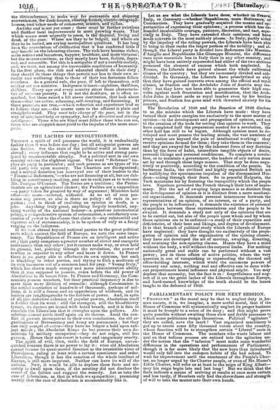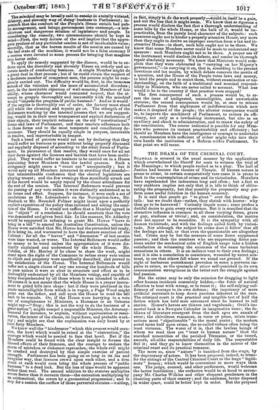PARLIAMENTARY POLICY FOR NEXT SESSION.
" PROFOUND " as the moral may be that to neglect.duty issbu- man nature, it is, we imagine, a more useful moral, that if the House of Commons will systematically neglect its proper business it must be brought to a sense of its duty ; and this might prove quite possible without awaiting those slow and feeble processes to which some politicians resign themselves. Political "agitators" they are called, save the mark Vast organized machinery is got up to create some fifty thousand voters about the country, whose function will be to strengthen certain "Liberal" sects in the House of Commons. The numbers who waste labour and zeal on that tedious process are enticed into the agitation tin- der the notion that the " infusion" must make some wonderful difference in the operations and performances of Parliament; though it is far more likely that the new boys thus introduced would only fall into the common habits of the bad school. To wait for improvement until the enactment of the People's Char- ter, no longer urged by the Charter people, or even of Mr. Hume's Little Charter, will refer us at least to the reign of King Albert— may his reign begin late and last long! But we think that the facts indicate a means of arriving at results at once more certain and less tardy, if Members only had the shrewdness and strength of will to take the matter into their own hands. rawaisieeiltief-eitay be brondlysaid tia consist, in a edtally vitiated; diletorY, and (slovenly ward:01°44i businsain Parliament; in. scinech that the conduct .of the Peeples_ House entails bad pule._ lic omnegeinente an brings. goeernraente into contem pt,—a mis- chievous and dangerous letion.of ilegislature and,people. In onsidering, the remedy,,etwo-c,irennsstanoes i.ebould be kept in c rnin.4,--Fir8e, the very nature, of -Owned implies' that the aggre- gate. prodUce of any particular session is-not of incalculable value; secondly, that as the barren results-of the seesien are caused by the had state of the machine, it would not be a false economy if a session were devoted to some process for bringing that maehine
into better order.- • , , ,
To apply the remedy suggested by the disease, would be to en- force.upon the disorderly and slovenly House an orderly and ac- curate mode of conducting business. A- single Member Might do a great deal in that process ;.but if he could obtain the support of a moderate number of competent imen, the-erotess might be com- pletely carried out. The difficulty would lie, first, in the immense extent of the vitiation and the mass a accumulated disorders ; next, in the inevitable objection of .well-meaning Members of fair ability, whose- character would commend respect, that the at- tempt to grapple thoroughly and inexorably with the mischief would" impede the progress of pn blie business:" A nd, se" it would - if the engine is thoroughly out of order, the factory must stand still while the cleaning and repairs go on. The strength of the Reformers working by the internal process that we are suggest- ing,-would lie in their most transparent and explicit declaration of their objects, their implicit reliance on the old " constitutional " forms and laws of Parliament, and their resolute adherence both to those forms and to the most temperate and conciliatory de- meanour. They should be equally single in purpose, inexorable in resolve' and imperturbable in temper. Such aband of patriots would set out by declaring that they would suffer no business to pass without being properly discussed and regularly disposed of according to the strict forms of Parlia- ment. In pursuance of that resolve, they would once forall set their faces against the licences and laxities that have been multi- plied. They would suffer no business to be carried on in a House containing fewer Members than the lawful quorum. Such a stringency might cause a "count out" unexpectedly ; but it would spur up all Members interested in avoiding that scandal— that unmistakeable confession that the elected legislators are playing truant; and the few evenings thus manifestly struck out of the record would be amply repaid by the closer attendance for the rest of the session. The Internal Reformers would prevent the passing of any vote unless it were distinctly understood as to its terms and effect. Suppose, for instance, it were such a set of resolutions as Mr. Labouchere's on the Navigation-laws, Mr. Roebuck or Mr. Roundell Palmer might insist upon a perfectly explicit exposition of the policy thus initiated and asking the sanc- tion of the House. It would not suffice that a Member agreed in the " object " of a resolution : he should ascertain that the vote was demanded and given bona fide. In like manner, Mr. Adderley would be supported in refusing to grant Mr. Hawes "leave to bring in a bill" to amend the Australian Constitution, unless the House were satisfied that Mr. Hawes had the pretended bill ready, fit to bring in, and warranted to have the mature sanction of the Cabinet : for all the " leaves " and "discussion " of last session were time wasted, or worse. The Internal Reformers would suffer no money to be voted unless the appropriation of it were dis- tinctly explained and understood by the whole House. Mr. Cobden, or Mr. Henley if he chose to share the work, might stand upon the right a the Commons to -refuse every vote unless its object and propriety were specifically described, and proved to the satisfaction of the House. The Internal Reformers would suffer not a single clause of any one among the hundreds of bills to pass unless it were so clear in structure and effect as to be thoroughly understood by all the Members voting, and capable of being comprehended by all those whom it was intended to affect. Of course it is not meant that the whole House is a proper instru- ment to grind bills into shape : but if they were produced in the crude unintelligible form which is in vogue, a Page Wood might point out the defect, and call upon the House to send the bill back to be remade. Or, if the House were hurrying to a vote out of complaisance to _Ministers, a Horsman or an Osborne might say—" Stop ; this is not the way to do the business of a great nation"; might compel a responsible Minister, the Attorney. General for instance, to explain, without equivocation or reser- vation, the intent of the clause, its legal force, and probable work- ing; and might see that the explanation was duly heard by at least forty Members.- We know well the " hinderance " which this process would occa- sion, the howl which would be raised at the "obstruction," the courage which would be needed to face that howl. But if the Members could be found with the clear insight to foresee the blessed effects of their firmness, and the courage to endure the storm of mistaken or dishonest reproaches' the whole evil might be crushed and destroyed by that simple exercise of patient strength. Parliament has been going on so long in its lax and irregular way, that licences crowd upon each other, and a firm Stand at each would soon bring the whole process of "public business" to a dead lock. But the loss of time would be apparent rather than real. The annual addition to the statutes multiplies errors faster than it corrects them—the correction multiplying by an arithmetical, the errors by a geometrical progression ; and to stop for a session the outflow of those perverted statutes—waiting, in fact, simply te do the work properly—would in itself be a gain, and not the loss that it might seem. We know that so rigorous a process would disclose the fact that a thorough understanding of some bills by the whole House, or the bulk of it, would be im- practicable, from the purely local, character of the subjects : such measures ought not to hinder a properly attentive House, any more than they ought to derive an improper sanction from a lax and in- attentive House—in short, such bills ought not to be there. We know that some Members never could be made to understand any measure : such Members ought not to be there. A proper use of the instrument would disclose its defects, and render its thorough repair absolutely necessary. We know that Ministers would com- plain that they were obstructed in "carrying on her Majesty's government,"—in carrying it on, that is, according to the present licentious and lax modes, by which debate conceals the merits of a question, and the House of the People votes laws and money, to bind the people and to mulct them, without examination or un- derstanding, on the faith of a traditional and nominal responsi- bility in Ministers, who are never called to account. What loss would it be to the country if that practice were stopped?
The first consequence of such a process would be, to ar- rest the issue of undigested, unintelligible, and unworkable statutes; the second consequence would be, at once to release Parliament from that nightmare of indifferentism which now makes it despised of the people; the ulterior consequence would be, to improve the machinery of Parliament, to restore its effi- ciency, not only as a lawmaking instrument, but also as an auxiliary and check to administration, and to renew the safety of the constitution. The course indicated is possible for any Mem- bers who perceive its instant practicability and efficiency ; but should no Members have the intelligence or courage to undertake it, constituencies with sufficient of either might take into their own hands the institution of a Reform within Parliament. To that point we will recur.



























 Previous page
Previous page